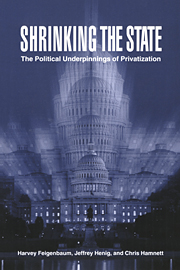Book contents
- Frontmatter
- Contents
- Acknowledgments
- 1 Privatization and theories of state growth
- 2 The political underpinnings of privatization
- 3 The United Kingdom: from pragmatic to systemic privatization
- 4 France: from pragmatic to tactical privatization
- 5 The United States: the co-optation of pragmatic initiatives by agents of systemic change
- 6 The boundaries of privatization
- Index
6 - The boundaries of privatization
Published online by Cambridge University Press: 08 March 2010
- Frontmatter
- Contents
- Acknowledgments
- 1 Privatization and theories of state growth
- 2 The political underpinnings of privatization
- 3 The United Kingdom: from pragmatic to systemic privatization
- 4 France: from pragmatic to tactical privatization
- 5 The United States: the co-optation of pragmatic initiatives by agents of systemic change
- 6 The boundaries of privatization
- Index
Summary
Privatization restores government to its fundamental purpose and relieves it of burdensome functions for which it is ill-suited. This truth is finally being grasped and applied successfully throughout the world.
The fact that across the OECD … privatisation programmes have been implemented under conservative, liberal and socialist governments points to the existence of economic and social dimensions of privatisation which transcend ideological differences and appeal to parties across a broad spectrum.
To its proponents, the breadth, speed, and seeming unity of purpose of the world-wide privatization movement give it a status as a revealed truth. Its breadth is attributed to the universality of the economic laws that dictate the ultimate dys functionality of the modern welfare state. Its suddenness is attributed to the power of ideas and evidence to spark sharp political reversals. Rational choice theory predicted that the weight of government would dampen growth, and its extension to the world of politics predicted that government agencies would elevate their own interests over those of the public. According to the proponents of privatization, these ideas penetrated the facade of benevolence protecting the state, and opened the eyes of the mass public to the role of the state as a protector of elite privilege. The unity of purpose behind the privatization movement is attributed to the windfall of growth that privatization will spark, elevating the issue above the zero-sum politics that normally generates factionalization and maneuvering for competitive advantage.
- Type
- Chapter
- Information
- Shrinking the StateThe Political Underpinnings of Privatization, pp. 147 - 174Publisher: Cambridge University PressPrint publication year: 1998



